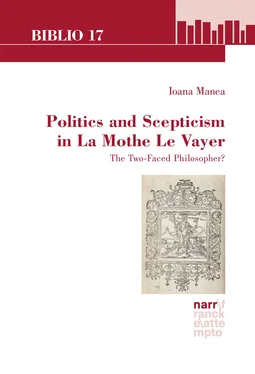In order to be fertile, the mind has to be carefully sustained by means of studying because without that all it could give birth to is flawed, and its creations would be nothing more than a poor aborted matter instead of something animated, which would be capable of perpetuating its good name.
Il faut que l’esprit, qui doit produire soit soigneusement alimenté par le moyen de l’étude, parce que sans cela il ne saurait rien enfanter que d’imparfait, et l’on ne verra sortir de lui que de chétives môles destituées de vie, au lieu de quelque chose d’animé, et qui fût capable de perpétuer un beau nom.9
Using as a starting point the metaphor of conception, the author contrasts two types of creation among which one leads to the birth of a child while the other leads to the appearance of a mass that is amorphous and lacks life. In order to avoid writing a work that would be condemned to sink into oblivion, an author must fit into the tradition that the men of letters have been building ever since antiquity. Therefore, in order to be able to write books that would be able to outlive him, he has to act as part of this tradition and to express himself by relying on the works of the writers who preceded him. Far from defending plagiarism, which he considers the work of a “thief” (“voleur”), who makes more use of his hands than of his brain, La Mothe Le Vayer holds that building on other’s works in fact amounts to “contributing something which belongs to us and seasoning what we take from the others in such a way that we provide it with a charm that has some aspect of novelty” (“contribuer quelque chose du sien, et assaisonner ce qu’on tient d’autrui de telle sorte, qu’on lui donne une grâce, qui ait quelque air de la nouveauté”).10 Hence, using other writers’ works should not result into simply copying them, but into inserting them into works capable of highlighting the new meaning that has been added to them after a previous reflection. The taste for quotation11 does not stop him from disapproving of the cento which, according to him, errs by a lack of moderation that leads to the creation of a work based on the simple collection of excerpts from other works:
Indeed, if he [the orator] composed a discourse which resembled those that the Latins called centos and that were only texts taken from different authors and put together, like Lipsius did in his six books of the Politics , I acknowledge that such a work could not be thought of to be a piece of eloquence.
À la vérité, s’il [l’Orateur] en composait un discours de la façon de ceux que les Latins ont nommé centons, et que ce ne fussent que des textes de différents auteurs attachés les uns aux autres, comme Lipse les a mis dans ses six livres de la Politique , j’avoue qu’un tel travail ne pourrait pas passer pour une pièce d’éloquence.12
Obviously, La Mothe Le Vayer is a great book-lover. When thinking about the writers he holds indispensable for a library reduced to its essential aspects, in addition to names like Gassendi, Francis Bacon and William Gilbert, he is not afraid of mentioning authors like Galileo Galilei, Giordano Bruno or Tommaso Campanella, whose relationships with the Holy See were at least strained.13 In so doing, he does not hide his admiration for the recent authors whom he considers worthy of being called rather “founders” (“instaurateurs / fondateurs”) than “innovators” (“novateurs”) because they managed to take the philosophy out of the simple verbiage.14 Nevertheless, his reading preferences concern especially the writers of the classical antiquity: “Honestly speaking, the books of the ancients have a certain je ne sais quoi that attracts me more than the new ones […]”(“À parler franchement, les livres des anciens ont je ne sais quoi qui me charme tout autrement que les nouveaux […]”)15 Moreover, despite his regard for the inventors of his time, he does not play down what, to his mind, they owe to the authors of the classical antiquity: “Scholars must also openly admit that five or six Greek and Latin authors, with a special emphasis on the former ones, are the masters of everything they possess in the field of knowledge […] ” (“Les savants doivent aussi reconnaître ingénument, que cinq ou six auteurs grecs ou latins, et surtout les premiers, sont les maîtres de ce qu’ils possèdent de connaissance […]”)16
Despite the appearances, the library is not the only space that allows La Mothe Le Vayer to satisfy his insatiable passion for books. However fond he may be of closed spaces like the library or the reading room, essential to the work of the man of letters, he does not neglect to educate himself by means of another book, the “book of the world”:
What must be said in this respect, is that a philosophical mind knows how to profit from everything that can be seen in the world, which he examines with a completely different pleasure than the ordinary people and which he could call, following St. Anthony the Hermit, his library which he finds everywhere, and which never abandons him.
Ce qui se doit dire à ce propos, c’est qu’un esprit philosophique sait faire son profit de tout ce qui se voit dans le monde, qu’il considère avec un bien autre plaisir que le commun des hommes, le pouvant appeler après saint Antoine l’Hermite, sa bibliothèque qu’il trouve partout, et qui ne l’abandonne jamais.17
Despite his alleged debt to saint Anthony, he turns the study of the world into the attribute of a spirit who defines himself more through his connections with philosophy than with theology. According to Éphestion, a character of the Dialogue traitant de la philosophie sceptique , the “reading” (“la lecture”) of “this beautiful book of the world” (“de ce beau livre du monde”) “serves as a lesson for the true, pure, and essential philosophy” (“sert de leçon à la vraie, pure, et essentielle philosophie ”).18 Developed by the Stoics in reaction to the followers of atomism, the metaphor of the “book of the world” is, according to the thought of St. Augustine, opposed to the Bible. As the bishop of Hippo sees it, while the Bible is reserved for those who know how to read, the “book of the world” is accessible to everyone.19 Unlike St. Augustine, La Mothe Le Vayer holds that the study the “book of the world” is specific to the philosophers. Following its definitions given by Furetière’s Dictionnaire universel , philosopher is “a strong mind that rises above the others” (“un esprit ferme, élevé au-dessus des autres ”) and who “searches for the natural causes, and studies the science of customs” (“qui recherche les causes naturelles, et étudie la science des mœurs ”).20 As far as he is concerned, when speaking about the philosophers, La Mothe Le Vayer seems to refer mainly to individuals who distinguish themselves from others through the activity of thinking. One of the objects of their thinking is a nature whose causes, contrary to Furetière’s view, they do not try to make out.
1.2 Supporter of Curiosity that Leads to Admiration
It goes without saying that, in order to be able to immerse oneself in the reading of the “book of the world”, one must beforehand show some curiosity for it. Consequently, it is not at all surprising to see that La Mothe Le Vayer defends curiosity against the disciples of the school of Port-Royal who, in the wake of St. Augustine, condemn it. Relying on the First Epistle of St. John, the bishop of Hippo argues that the actions of the man who is fallen and devoid of grace are brought about by three main causes, libido sciendi , libido dominandi and libido sentiendi .1 These three causes which, as it is shown for instance in Pascal’s Pensées , are also called concupiscences , make reference to pride, sensual pleasure and curiosity.2
Читать дальше












